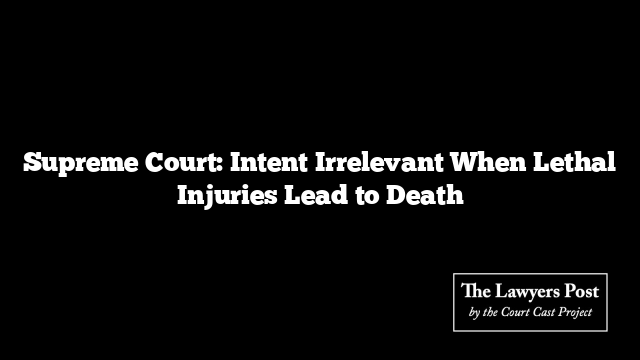In a pivotal ruling, the Supreme Court upheld the murder conviction of an individual who fatally injured another during a scuffle. The Court emphasized that under Section 300 IPC, the lack of intent or premeditation does not absolve the accused if the inflicted injuries, caused with a lethal weapon, are sufficient to cause death in the ordinary course of nature.
A bench comprising Justices Vikram Nath and Prasanna B. Varale dismissed the appellant’s argument that the fatal act was spontaneous and unintentional. The judgment underlined that the nature of the injuries, the weapon used, and the choice of targeting vital organs override claims of spontaneity.
The Court referred to the principles established in the landmark Virsa Singh v. State of Pepsu (1958) case. It reaffirmed that to classify an act under clause (3) of Section 300 IPC, four critical elements must be proven:
- The presence of a bodily injury.
- Proof of the injury’s nature.
- Intention to inflict the specific injury.
- Evidence that the injury was sufficient to cause death in the ordinary course of nature.
The ruling clarified that intent to kill or knowledge of the fatal potential of an act becomes secondary if the act of causing the injury is deliberate, and the injury itself meets the criteria for fatality.
In its judgment, the Court observed:
“Even if it is presumed that the accused lacked an intent to kill, the deliberate infliction of injuries on vital organs with a lethal weapon demonstrates sufficient knowledge of the consequences. The accused’s actions thus meet the threshold for murder under the law.”
The Court further dismissed the appellant’s plea for leniency on the grounds of spontaneity, stressing that the choice of weapon, the targeted vital areas, and the severity of the injuries all indicated deliberate action.
“While the incident may have arisen from a scuffle, the escalation to the use of a knife and the calculated targeting of vital organs elevate the act from culpable homicide to murder,” the judgment stated.
Ultimately, the Court ruled that the argument of spontaneity did not diminish the gravity of the crime. The appeal was dismissed, reinforcing the principle that accountability under Section 300 IPC hinges on the objective facts of the injury inflicted, rather than subjective claims of intent.





